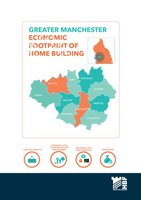Greater Manchester missing out on social and economic benefits of house building
Over 9,000 homes were built in the last year, but the Mayor can do more
A new report released today, based on research carried out by Lichfields for the Home Builders Federation (HBF), has revealed the full extent of the community and economic benefits of house building in Greater Manchester[1]. And with the region still not building enough homes compared to its need, the Economic Footprint of Home Building report also highlights just what Greater Manchester is missing out on.
Figures show that 9,172 new homes were provided in the region in 2017/18, generating over £1.5bn to the local economy, a fantastic benefit for Greater Manchester.
The report shows that in 2017/18, house building in Greater Manchester was responsible for:
- Supporting and sustaining over 28,000 local jobs
- Delivering over £1.5bn of economic activity, the equivalent of the 2018 budget to support the UK high street[2]
- Generating over £110m of tax, the equivalent of employing approximately 4,687 new police constables[3]
- Delivering over £7m of spending on new and improved schools, the equivalent of employing 312 additional newly qualified teachers[4], or funding 1,573 additional primary school places[5] for a year
- Generated over £250m investment in new Affordable Housing
But the Home Builders Federation is calling on Greater Manchester Mayor Andy Burnham to do more by lifting the level of proposed new housebuilding over the next twenty years from 201,000 new homes in the new Draft Greater Manchester Spatial Framework to 227,000 so that this aligns with the Government’s Housing Deal for Greater Manchester.
This would mean an extra 26,000 houses, which would bring to Greater Manchester:
- Over 80,000 jobs created, including almost 900 graduate and apprentice positions
- Over £720m invested back into affordable housing
- Almost 28,000 people in direct employment through house building
- Well over £300m generated in tax
As well as being a major employer and supporter of local supply chain businesses, new developments make significant contributions towards local infrastructure and amenities through development taxes, as shown by data collected from the region in the last few years.
The report also underlines the impact the Government’s Help to Buy scheme is having in the region. More than 7,000 properties have been purchased using the scheme across the Greater Manchester since its launch in 2012, with 87% of those purchases coming from first time buyers.
Since 2012, both Salford and Wigan have enjoyed a flourish of house building to cope with demand. Salford reported a 109% increase to housing stock up to 2017/18, and Wigan reported a 241% increase.
On the other hand, areas like Bury, Oldham and Tameside are not meeting targets. Over the same five-year period of growth for Salford and Wigan, Bury experienced a 0% increase in housing stock, with Oldham and Tameside experiencing -5% and -25% respectively.
Stewart Baseley, Executive Chairman at the Home Builders Federation, said; “House building makes a huge social and economic contribution to Greater Manchester.
“Since the Government committed to building an ambitious 300,000 homes per year across the country, Greater Manchester has to ensure that it is doing it’s part to meet the targets given.
“This research shows that the home building industry is delivering much more than bricks and mortar and providing a massive economic boost to Greater Manchester.
People often don’t realise that the new community centre, school or sports facilities have been funded directly as a result of housing developments. Ultimately, providing new homes for people also means better facilities for the wider community.”
Housing is inextricably linked to the wider health of the economy and it is often referred to as a key barometer of national economic performance. But it is also important to recognise that it also has a range of significant effects on economic performance at regional and local levels too. In particular, house building:
- Drives regional economic growth through its vast and varied supply chains and contracting relationships;
- Generates unrivalled investment multiplier effects with very little import leakage due to the extensive use of local and regional suppliers and services;
- Delivers real jobs both on-site and off-site in associated trades, such as cement production and brick manufacturing, as well as in research and development fields looking at technological innovation areas such as Modern Methods of Construction;
- Creates economic value through new residents as they spend money on goods and services in the local economy;
- Supports labour market mobility wellbeing by enabling local people to move jobs freely and achieve their economic potential;
- Enhances “place competitiveness” and local economic development by improving the perceived competitiveness of specific locations and reducing the costs of mitigating social and environmental problems associated with poor or insufficient housing.
For media enquiries, or to arrange an interview, please contact Claire Coward on 020 7960 1614 or 077 3268 2114. claire.coward@hbf.co.uk
Notes to editors
- The Home Builders Federation (HBF) is the representative body of the home building industry in England and Wales. The HBF’s member firms account for some 80% of all new homes built in England and Wales in any one year, and include companies of all sizes, ranging from multi-national, household names through regionally based businesses to small local companies: hbf.co.uk
- Please see the Greater Manchester Economic Footprint Report for more detailed figures.
[1] For the purposes of this report, Greater Manchester refers to the Greater Manchester Combined Authority which includes Bolton, Bury, Manchester, Oldham, Rochdale, Salford, Stockport, Tameside, Trafford and Wigan.
[2] Over £1.5bn to support the high street, Budget 2018: 24 things you need to know
[3] Police Now, Salary and benefits (Based on average basic starting salary of £23,586)
[4] Prospects, How much do teachers get paid? July 2018 (Based on NQT salary)
[5] BBC News, Seven charts on the £73,000 cost of educating a child, 19 November 2018
